

Reflections on a Journey
The possibility of teaching and learning about the Holocaust in Israel was only a dream until February of this year when my Dutch cousin Rob Cassuto suggested I attend the 4th annual conference on Holocaust Education at Yad Vashem in Jerusalem. He made it possible for me to go, and when I told my brother Ben, he wanted to join me. Ben is a veterinarian, but because of our family history, he has a deep interest in the life of the Jewish people and their role on the world stage. He is a practicing Messianic Jew, which was the tradition of my parents after they survived the Holocaust. So Ben assembled a presentation on the motives behind the "Righteous Gentiles" that protected Jews during the Nazi Terror. I submitted my proposal to present at the conference on Using the Internet to Teach the Holocaust. When we were both accepted, we started to make plans to attend the conference in Israel.
Yad Vashem sponsored the conference, and it was held on their 45-acre campus in Jerusalem. The organization has a Center for Holocaust Research and a School for Holocaust Studies, as well as an art museum and a historical museum. The United States Holocaust Memorial Museum was developed after Yad Vashem, which seems to be the granddaddy of Holocaust Exhibitions. But with excellent story telling and multi-media approach, it seems like the US Museum in Washington, DC had outdone its Israeli counterpart. But Yad Vashem is in the process of building anew historical museum with a projected completion date of March of 2005. It may be an effort to outdo the much-acclaimed work of the US Holocaust Memorial Museum.
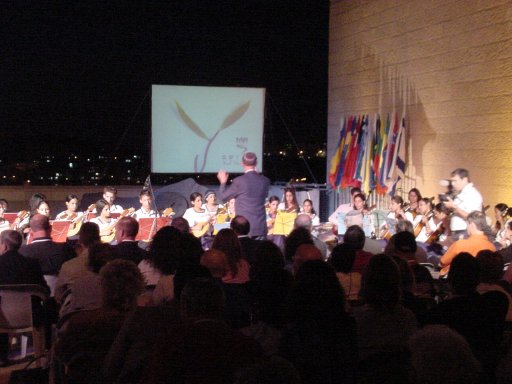 The conference consisted of presenters from around the world.
Hotels all over Jerusalem housed both presenters and attendees. We arrived on
August 6, and took the rest of the day to settle in. On the first day of the
conference, we enjoyed a tour of the sculpture, artwork, and history of the Yad
Vashem campus. The evening concluded with the opening ceremony in the School
courtyard. We heard speakers and a mandolin symphony as well as the Israeli folk
singer Shulie. Then it was off to our hotel for the evening.
The conference consisted of presenters from around the world.
Hotels all over Jerusalem housed both presenters and attendees. We arrived on
August 6, and took the rest of the day to settle in. On the first day of the
conference, we enjoyed a tour of the sculpture, artwork, and history of the Yad
Vashem campus. The evening concluded with the opening ceremony in the School
courtyard. We heard speakers and a mandolin symphony as well as the Israeli folk
singer Shulie. Then it was off to our hotel for the evening.
It was my hope to keep a web journal in near-real time, but the hotel only had an Internet kiosk, and there was no way for me to connect in my room. I also needed an electrical adapter to be able to use the AC of my laptop. The front desk had one, so I was able to work on the photographs I took each day. The final count of images for the week was over 300, so I had to edit them down to just the highlights. And each image needed to be mounted in its own web page. So I settled for writing by hand in my notebook journal, with the hopes of converting my impressions into web pages shortly after returning to the states.
My Own Agenda
I wanted to focus on several areas of study: they included but were not limited to:
The best practices in teaching the Holocaust to American students. In preparation for that topic, I completed Sam Totten's Holocaust Education on the plane. The book was a good tool for organizing the skills I had inadvertently gained over the twenty years I had taught the Holocaust. (too bad I left my copy of the book on the first plane to Newark. If I don't get it back from Continental, I'll reorder it from socialstudies.com).
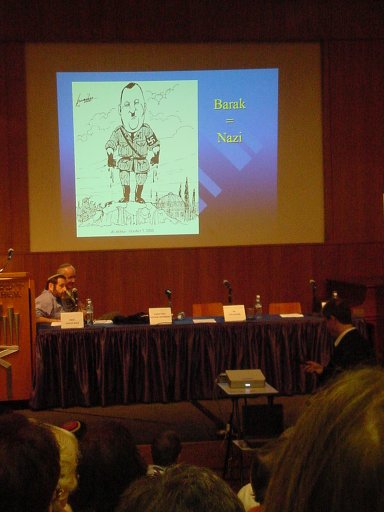
The image says Barak = Nazi |
|
The existence of the Jewish state as a pluralistic democracy. I wanted to see how Jewish identity found its expression in national politics while allowing for the existence of minorities and positions representing the loyal opposition. Could a realistic dialogue regarding the policies of the government exist when the expressed purpose of the state was to protect one religious group?
The history of the Jewish people from their biblical claim
to the "promised land," through its existence as a Roman outpost,
the persecution it experienced during the birth and spread of Christianity,
and the history of the land during the crusades of the Middle Ages and its
conquest during the Muslim dynasties up until British rule. The
establishment of the state of Israel, its war for independence, and the
effects of the Six Day war were also topics I knew little about but could
not miss through our time among the people and places of Israel.
I did not know that I would learn more about my own family
and its role in biblical scholarship and Israeli life. I knew about Umberto 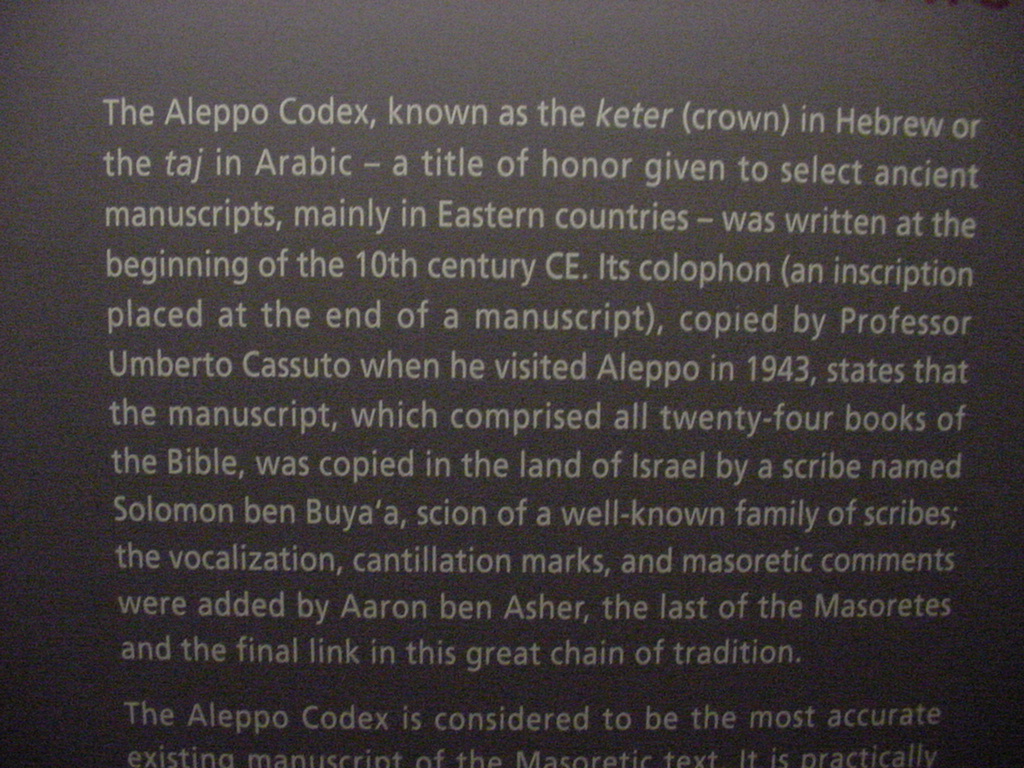 Cassuto, the great biblical scholar who did a study of the book of Exodus in
the 1950s. My brother would take the initiative and contact David Cassuto, a
well-known architect in Jerusalem who we later learned was vice-mayor of
Jerusalem during the 1980s. Moreover, our presence at Yad Vashem would allow
us to learn more about the family members and loved ones that died in the Holocaust.
and we learned about family members we did not know existed.
Cassuto, the great biblical scholar who did a study of the book of Exodus in
the 1950s. My brother would take the initiative and contact David Cassuto, a
well-known architect in Jerusalem who we later learned was vice-mayor of
Jerusalem during the 1980s. Moreover, our presence at Yad Vashem would allow
us to learn more about the family members and loved ones that died in the Holocaust.
and we learned about family members we did not know existed.
A land of contradictions
It is impossible to characterize one person's journey through
Israel, its history and its people. To be sure, it is a nation and people of
contradictions.
The state of Israel is the homeland and sanctuary for the world's Jews, yet the
definition of "what is a Jew?" is still a matter of debate even among
Jews themselves. Moreover, along with the diversity of the groups that make up
Israel's Jewish population (there are a high number of Russian émigrés as well
as Ethiopian Jews brought in by the Israeli government as well as an entire
spectrum of levels of religious practice, most notably the very orthodox known
as the Chasidim), there are a variety of Arab, Christian, and Muslim people
within Israel's borders.
Arabs and Israelis
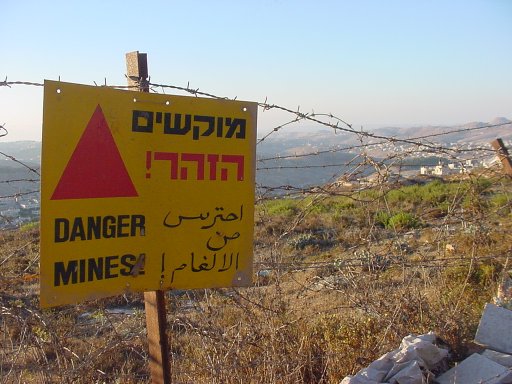 Another contradiction involves the way Arabs and Jews perceive
history. Each sees the other as rewriting history to preserve and support their
own political view. I asked a Bedouin Arab and a young Arab Israeli cabbie how
they felt they were treated as a member of Israeli society, The Bedouin stated
"they don't bother me, so I don't bother them." The Arab cabbie was
much more negative, showing anger at the Russians and Ethiopians who just
arrived in Israel but who ask him "where are your papers?" It appeared
that there was a hierarchy within the society. The Jews were at the top since
the state was formed for them. But there were Arabs living on the land at the
time of independence in 1948. Many of them fled, and the Israeli government will
not negotiate on their "right of return." Those that stayed and
integrated themselves into Israeli society feel like second class citizens.
Admittedly, they have rights: the right to vote and to participate in politics.
But they feel like outsiders in their own land. Then at the bottom are the
Palestinians, many of whom must work within the borders of Israel. When I
discussed this view with David Cassuto, he agreed that such social strata might
exist, but he justified it by stating that once the prosperity of Israel had
been established by the Jewish people, the Arabs and Palestinians benefited from
the new world the Jews of post 1948 had built.
Another contradiction involves the way Arabs and Jews perceive
history. Each sees the other as rewriting history to preserve and support their
own political view. I asked a Bedouin Arab and a young Arab Israeli cabbie how
they felt they were treated as a member of Israeli society, The Bedouin stated
"they don't bother me, so I don't bother them." The Arab cabbie was
much more negative, showing anger at the Russians and Ethiopians who just
arrived in Israel but who ask him "where are your papers?" It appeared
that there was a hierarchy within the society. The Jews were at the top since
the state was formed for them. But there were Arabs living on the land at the
time of independence in 1948. Many of them fled, and the Israeli government will
not negotiate on their "right of return." Those that stayed and
integrated themselves into Israeli society feel like second class citizens.
Admittedly, they have rights: the right to vote and to participate in politics.
But they feel like outsiders in their own land. Then at the bottom are the
Palestinians, many of whom must work within the borders of Israel. When I
discussed this view with David Cassuto, he agreed that such social strata might
exist, but he justified it by stating that once the prosperity of Israel had
been established by the Jewish people, the Arabs and Palestinians benefited from
the new world the Jews of post 1948 had built.
Israel and Jewish Identity
I found Israelis to be friendly, beautiful people who are keenly aware of their history, but who are indifferent to the way their situation is perceived by the world. They are proud of their history, and the faith of the Jewish people is a strong fiber that runs through the fabric of day-to-day Israeli life. This makes them a very independent nation with the will to take measures needed to insure their own security. The memory of the Holocaust continues to be fresh sixty years after the event. This theme was evident in some of the speeches I heard at the Yad Vashem conference. Israel knows that it is surrounded by potential and real enemies, so it must maintain an aggressive yet defensive posture in the region. From my hotel veranda, I was able to see the security fence that has kept suicide bombers out for four or more months. There was a question that came up at the conference that asked "Does 'Never Again' mean "Never Again to the Jews?" In an attempt to face that issue, it was the purpose of the conference to discuss how the horrors of the Holocaust should be implanted in the minds of Israeli kids as well as students all over the world....
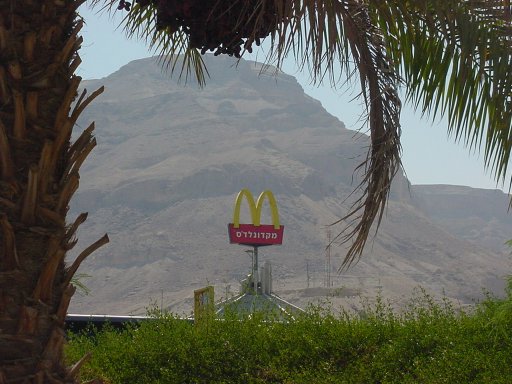
What is Israel's role in the world?
All Images
© George Cassutto, 2004